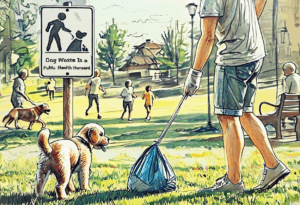
Have you been feeling overwhelmed or hopeless at the thought of climate change? Do you picture a future of burning embers falling from dark skies and industrial facilities pumping black clouds into the air (Lorax, anyone)? Well, I have been there too, and surprisingly climate fiction helped those visions start to change into motivating, hopeful futures.
Climate fiction often has a similar feeling to science fiction or futuristic fiction, but explicitly explores the impacts of climate change on human (and nonhuman) societies. By reading about more tangible future possibilities, I have been able to maintain realism without accidentally falling into defeatism. Below, I have compiled a list of seven of my favorite climate fiction (or climate fiction-adjacent) books to pull you out of climate anxiety.
This book is a must if you are living in a coastal city (specifically New York, but any major city by the water will work), are interested in sea level rise, or care about economics and global markets. While the writing drags at times (and this is an over-600 page tome), the author crafts a fascinating, novel world in which New York is a SuperVenice and humanity is still standing despite 50-feet of sea level rise.
The entire concept behind the sea level rise in this novel is compelling. Instead of the gradual centimeters-per-year conception most people have, Robinson describes two “Pulses,” during which Antarctica and Greenland ice sheets collapse. Before the start of the novel, these ice sheet collapses cause rapid, extreme sea level rise (10 feet in 10 years, 40 feet in a similar period) — a much more realistic possibility. Actually, many people are worried about what is referred to as the “Doomsday Glacier” in Antarctica, which acts as a buttress to ice sheets behind it, which would be pulled into the ocean should it collapse (Mulkey, S. K., & Grist, 2024).
Aside from this, however, New York 2140 offers a vision of a world adapting to dramatic change; with mixed success, many continuing challenges, and a relatability that makes the world feel realistic. Robinson ends with a suggestion for a way forward, leaving readers with hope in the wake of destruction.
California is greedy, Nevada is struggling, and Arizona is a goner: drought and water insecurity have driven the American southwest straight into the dust of water wars. In the world of The Water Knife, characters work for larger-than-life political actors trying to secure the water rights of cities like Phoenix, Arizona. In a more substantial way than New York 2140, The Water Knife follows characters in order to explore how climate change might exacerbate already-harsh environmental injustices. All deeply hurt and lost, these characters are constantly struggling between survival and morality.
A fascinating future where drought is both so much worse and yet so similar to today, The Water Knife is so striking in how close it is becoming to a reality for states whose water supply relies on the Colorado River.
A captivating short story, Emergency Skin happens in a near-comical future in which Earth, burning and still occupied by billions, was abandoned by the rich and powerful in favor of a distant planet. But they need something from Earth to survive, so they send minions back to the planet to retrieve this necessity. What these minions find is… unexpected, to say the least.
Do you wonder what the world would look like if people pulling corporation strings abruptly vanished? Emergency Skin flies by and leaves readers thinking about a world grappling with a different power structure in the midst of environmental collapse.
California, Oregon, and Washington secede from the United States, forming Ecotopia. Callenbach spends most of his words worldbuilding through the perspective of an East-Coast journalist, but nevertheless his ideas of an environmental utopia are compelling (and somewhat characteristic of the outdoorsy, nonconformist conceptions many people have of the northwest coastal states). Can a society coexist with the environment, achieve sexual liberation, zero waste and zero emissions, enact universal healthcare, eliminate needless violence, patriarchy, and cars?
Despite many flaws (it was written in the 1970s, read a scathing review here), which include the problematic erasure of modern indigenous societies (and in some cases, appropriation of their practices), I found Ecotopia to be an interesting thought piece. It provokes questions of what type of environmental future we want, and what type is possible, while including not only those who agree but all people.
Enter the short book that single-handedly cured my pessimism: A Psalm for the Wild-Built takes place on a planet that experiences an alternate Industrial Revolution involving sentient robots that abandon the polluting warehouses en masse in favor of becoming one with Mother Nature. Beautifully written and escapism at its finest, this novella manages to be lighthearted and cozy, while also providing light commentary on impending climate disaster alongside a vision for a green society.
If you have lasted until now, here are two bonus books that have themes of climate change (but are not necessarily climate fiction).
Absolutely fascinating translated science fiction. Aliens. Living on a climatically unstable planet. If you are not a physicist, it makes you feel smart.
For the tree lovers and atmospheric readers, this book is lyrical and also ties in themes of preserving our planet. Oh, and it won a Pulitzer.
Hopefully, you have found a book here to motivate you in the face of a global climate crisis — and if not, you can always read more.
Works Cited
Joseph, P. (2021, April 7). Revisiting the 1970s eco-cult classic that gripped a nation. Grist. https://grist.org/article/joseph-ecotopia/
Mulkey, S. K., & Grist. (2024, June 3). Antarctica’s “Doomsday glacier” is melting even faster than scientists thought. Scientific American. https://www.scientificamerican.com/article/antarcticas-doomsday-glacier-is-melting-even-faster-than-scientists-thought/
The views and opinions expressed are those of the authors and do not necessarily reflect nor represent the Earth Chronicles and its editorial board.




